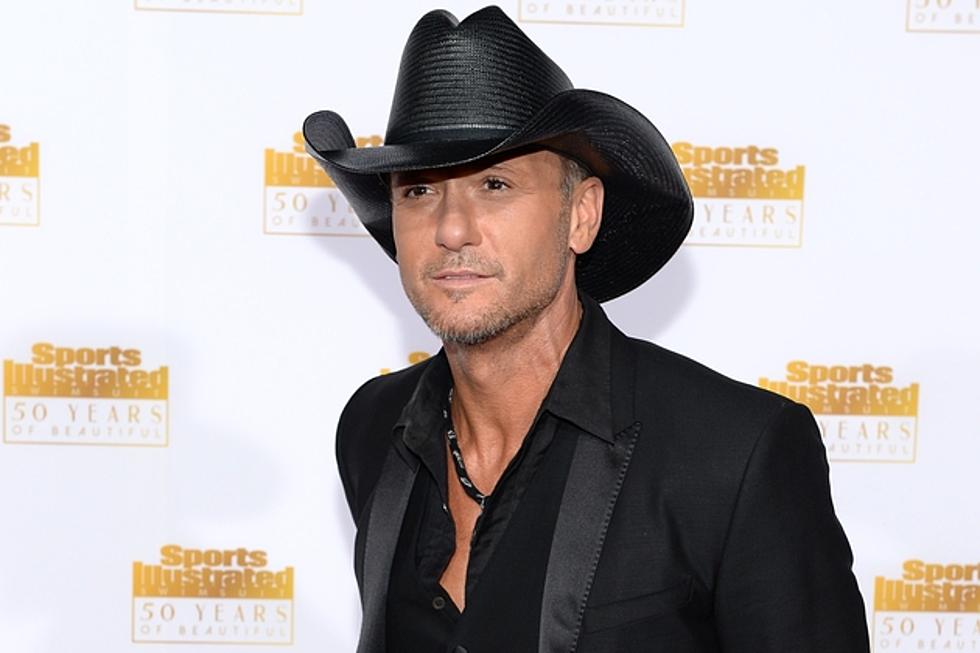
Country Chameleon: The Ever-Changing Music of Tim McGraw
Tim McGraw announced his 2014 touring plans and revealed his new single this week, and in the process, inadvertently touched off a new round in the ongoing pop-country debate.
The superstar's new single, 'Lookin' for That Girl,' shows McGraw not only keeping up with the changes at contemporary country radio, but anticipating them, turning his production in a decidedly pop-country direction by adding a sheen of auto-tune effects to the vocals. The result is something that is likely to build on his momentum at radio, but it's also already proven polarizing with certain elements of the country fan base.
"I'm very very disappointed... Just blown out of the water... This isn't the Tim McGraw that got 3 consecutive hits," one fan commented on Taste of Country. "LEAVE THE AUTOMATED STUFF TO POP AND HIPHOP!!! I can't be the only one that missed acoustic guitars and unautotuned voice."
The song came with its very own Twitter hashtag, #LookinForThatGirl, and a cursory reading of fan comments reveals a deep-seated schism in the listening public, with some complaining about the song and its sonic gloss, while others effusively praise the new track.
Many of the negative comments focus on the notion that there is no place in country music for auto-tune, which is more than a little ironic; one of Nashville's dirty little secrets is that -- although many, if not most fans are blissfully unaware of it -- the entire last decade-plus of country music has been dominated commercially by recordings featuring pitch-corrected vocals, to the point where it has long since been the norm in Music City.
But that largely consists of using Pro Tools to correct pitch in a way that isn't supposed to be audible to the listener, while McGraw's new single uses auto-tune as an element of the recording by turning it up so high that it causes a wavy, robot-like distortion that is a deliberate production choice.
The entire last decade-plus of country music has been dominated commercially by recordings featuring pitch-corrected vocals, to the point where it has long since been the norm in Music City.
That's more than likely a deliberate calculation designed to compete at radio with the younger, edgier acts that have taken up permanent residence in the Top 10, and while some purists will never accept that, it speaks to a larger issue in the industry -- namely, how does an older act with a long history continue to stay relevant in the face of changing trends?
At 46, McGraw is right at the age where most artists begin to fade from radio playlists, to be replaced by younger, more contemporary acts. But unlike many of his competitors, McGraw doesn't seem resigned to go gently into that good night. Trace Adkins, Alan Jackson and many other artists who have had huge radio careers are now releasing strong projects that are not designed for the format, essentially tacitly acknowledging that their time in the commercial spotlight has passed.
McGraw, on the other hand, has decided to actively get down in the trenches and mix it up with the hottest breaking acts in country -- which should be no surprise, given his history. The singer has always been one of the most unabashedly ambitious players in the country game, and he's always understood that there are certain concessions to trends that are inherent in the career of a commercial artist.
"When you're young, you spend a lot of time just wanting to succeed. But I think now, I still want to lead the race," he acknowledged last year. " I still want to be the guy. I want all those things, but I've always been a music guy, so I want to make what I do lasting. I've always wanted my music to matter."
Perhaps more than any other artist of his generation, McGraw has managed to do both over the last two decades, combining an unerring sense of what can succeed at country radio with a larger agenda that has seen him record some of the best-written, most challenging songs to come out of Nashville in that time.
That's been evident all the way back to the beginning of McGraw's career. Among his earliest hits were light-hearted commercial fare like 'Indian Outlaw,' 'I Like It, I Love It' and 'Down on the Farm,' but he also showed his more serious side early on with hits like 'Don't Take the Girl' and 'All I Want Is a Life.'
McGraw has gone on to score big hits with some fairly fluffy novelty songs, but he's also the man responsible for bringing 'Please Remember Me' and 'The Cowboy in Me' to a world audience. So yes, we do get ready-made radio hits like 'Truck Yeah,' 'Southern Girl' and now 'Lookin' for That Girl' from McGraw, but those keep him in the game -- and that allows him to also give the fans songs like 'Angry All the Time,' 'Live Like You Were Dying,' 'If You're Reading This' and 'Highway Don't Care.'
For better or worse, he's never been one to repeat himself -- McGraw has always been very cognizant of the latest trends and developments in recording, and he's always been among the first big-name artists to embrace new changes. That keeps his music sounding fresh and new -- even if it risks alienating some of his more traditional-minded listeners.
Fans can -- and will -- rant about the more commercial aspects of McGraw's song choices and productions. But let's not forget that he's responsible for giving country music songs like 'One of These Days' and 'Red Rag Top' -- songs so challenging for country radio that no other commercially successful country act would have dared to release them. And part of the reason they received airplay is because of the goodwill he's created with programmers, based in no small part on the success of his lighter efforts.
But let's not forget that he's responsible for giving country music songs like 'One of These Days' and 'Red Rag Top' -- songs so challenging for country radio that no other commercially successful country act would have dared to release them.
Does that mean 'Lookin' for That Girl' is the best work of McGraw's career? It really isn't the place of journalism to make that assessment -- it's the place of a music journalist to state what is, and what isn't. And in that light, the reality is that 'Lookin' for That Girl' is likely to score big in the current environment of country radio, and set up McGraw's forthcoming album -- his second for Big Machine -- as yet another career success.
We can only hope that in the mix of songs on that album will be at least another couple of would-have-been-hidden gems that he brings to light, and that he releases at least one of them as a single -- sandwiched, of course, between two lighter, more commercially calculated efforts, without which his more important song would probably have no shot at airplay.
In the modern-day world of country radio, that's the way it is and isn't -- and nobody understands that better than Tim McGraw.
More From TheBoot









